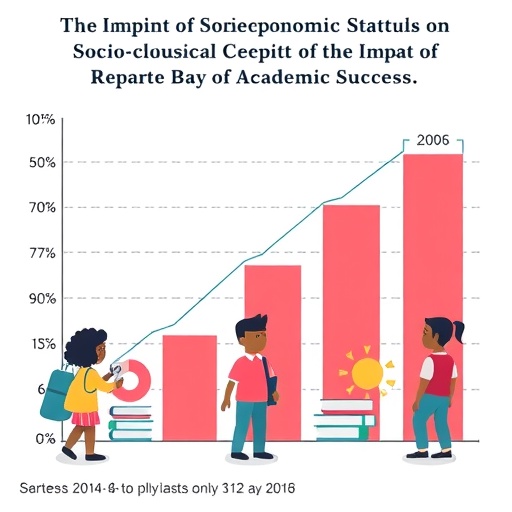In recent years, the intricate interplay between socioeconomic status (SES) and executive functions (EFs) has emerged as a focal point in education and psychology research. A systematic review and meta-analysis conducted by Hu, Xu, and Jiang et al. sheds light on the complex effects of these two critical factors on academic achievement. Their work highlights that both SES and EFs play significant roles in shaping students’ academic outcomes, but the nature of their relationship is not straightforward. It is essential to understand the nuances of these dynamics, especially in a world striving for educational equity.
The investigation into the effects of socioeconomic status on academic achievement has long been a subject of interest among educators and psychologists alike. Research has consistently indicated that students from lower SES backgrounds tend to face numerous barriers that can hinder their academic performance. These barriers may include limited access to educational resources, less parental support, and exposure to stressors that negatively affect cognitive development. However, the study by Hu and colleagues delves deeper, suggesting that the effects of SES are not merely direct but are mediated by executive functions, which encompass skills such as working memory, cognitive flexibility, and inhibitory control.
Executive functions have been linked to better academic outcomes for many years. Children with strong executive function skills are generally better equipped to manage their time, organize their thoughts, and maintain focus during tasks. These skills are critical for academic success, as they enable students to navigate the increasingly complex demands of modern education. Hu et al.’s systematic review emphasizes the importance of these cognitive skills, particularly for students from disadvantaged backgrounds who may not have the same opportunities to develop effective EF strategies.
A critical aspect of this analysis is the acknowledgment of how these two constructs interact. Socioeconomic status can influence the development of executive functions in children. For instance, children from lower SES households may encounter more environmental stressors that can impede cognitive development, ultimately affecting their executive function skills. Consequently, children with weakened executive functions, often arising from low SES conditions, may experience difficulties in their academic pursuits, resulting in a cycle of disadvantage that is hard to break.
Moreover, the findings reveal a two-way relationship between SES and EFs. Not only can socioeconomic disadvantages lead to impaired EF development, but low executive functions can also limit opportunities for upward mobility. When children struggle with executive functions, they may find it challenging to engage in activities that foster learning and growth, such as extracurricular programs or advanced coursework. This creates a compounding effect, where educational setbacks further entrench the socioeconomic challenges that these children face.
Understanding this complex dynamic has significant implications for educators and policymakers. To address the academic achievement gaps that persist across socioeconomic lines, there is a pressing need to implement targeted interventions that bolster executive function skills, especially for students from low SES backgrounds. Such initiatives could take various forms, from incorporating executive function training into school curricula to providing parents and caregivers with resources to support their children’s cognitive development at home.
Furthermore, the meta-analysis underscores the importance of considering individual differences within the larger context of SES and cognitive development. Not all children from low-income families face the same challenges, and variations in community support, parental involvement, and school resources can significantly impact outcomes. It is crucial that interventions are tailored to meet the diverse needs of students rather than applying a one-size-fits-all approach.
The review also calls attention to the need for longitudinal studies that track the relationships among SES, executive functions, and academic achievement over time. Such research could provide deeper insights into how these factors evolve and interact throughout a child’s educational journey. It would also help in identifying critical periods where interventions could be most effective, allowing for proactive measures rather than reactive solutions.
As the education landscape continues to evolve, the findings of Hu and colleagues serve as a crucial reminder of the interconnectedness of socioeconomic factors and cognitive development. They highlight that in our quest for educational equity, we must look beyond surface-level solutions and consider the root causes of academic disparities. Addressing these issues will require a collaborative effort among educators, policymakers, and communities, ensuring that all children have the opportunity to develop the skills necessary for academic success.
In conclusion, Hu, Xu, and Jiang et al. provide valuable insights into how socioeconomic status and executive functions jointly influence academic achievement. Their systematic review and meta-analysis illuminate the complex nature of these relationships, advocating for more nuanced approaches to understanding and addressing educational inequities. As we continue to explore these interconnected areas, it is vital to prioritize the development of executive functions in educational settings, ultimately fostering environments where all learners can thrive.
This emerging body of research emphasizes the urgency for systemic change—one that equally addresses the socioeconomic barriers to education while actively fostering cognitive skills among students of all backgrounds. By taking these findings to heart, we have the potential to transform educational outcomes and facilitate greater social mobility for future generations.
Subject of Research: Interrelationship between socioeconomic status, executive functions, and academic achievement.
Article Title: Uncovering the Complex Effects of Socioeconomic Status and Executive Functions on Academic Achievement: A Systematic Review and Meta-analysis.
Article References:
Hu, Q., Xu, C., Jiang, Y. et al. Uncovering the Complex Effects of Socioeconomic Status and Executive Functions on Academic Achievement: A Systematic Review and Meta-analysis.
Educ Psychol Rev 37, 112 (2025). https://doi.org/10.1007/s10648-025-10091-7
Image Credits: AI Generated
DOI: https://doi.org/10.1007/s10648-025-10091-7
Keywords: Socioeconomic Status, Executive Functions, Academic Achievement, Education, Cognitive Development




